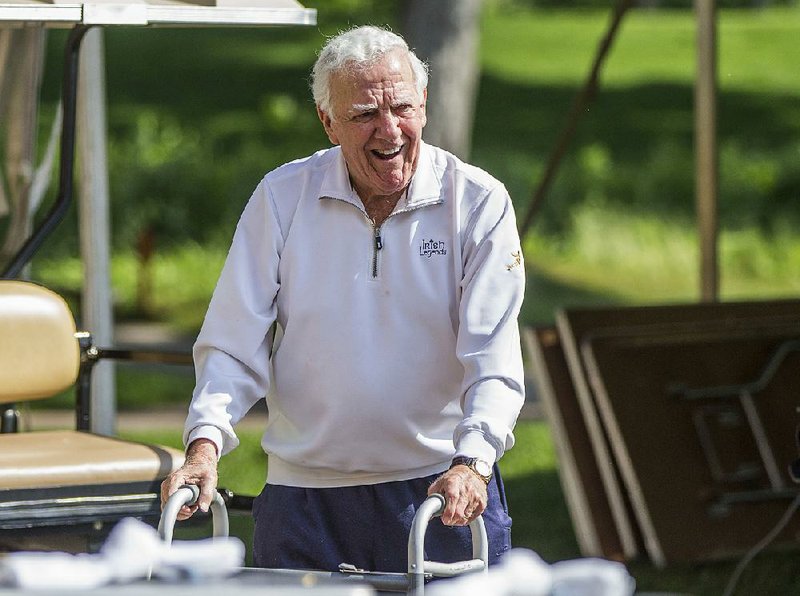Ara Parseghian, a Presbyterian of Armenian descent who became an unlikely savior of Notre Dame football, coaching the Fighting Irish back to greatness in the 1960s and '70s, died early Wednesday morning at his home in Granger, Ind.
He was 94.
The Rev. John Jenkins, president of the University of Notre Dame, announced the death in a statement.
Parseghian, whose home was not far from the university's campus in South Bend, Ind., had recently been undergoing treatment at a care facility for a hip infection.
Parseghian ranks with Knute Rockne and Frank Leahy in the pantheon of Notre Dame football coaches. In his 11 seasons (1964 through 1974), his teams won 95 games, lost 17 and tied 4, for a .836 winning percentage. His 1966 and 1973 teams were voted national champions.
When Parseghian arrived at Notre Dame, the university's football program had been in decline for years. The collapse started in 1956, when Notre Dame won only two games and lost eight. Notre Dame never won more than five games in a season from 1959 to 1963. Twice it won only two games.
Above all, Parseghian wanted to change the players' emotions. "The biggest problem was to re-instill the confidence," he recalled in a television interview years later. This he did, with an enthusiastic, hands-on approach in practices that were always well organized.
"He told us we were good; he'd give each of us a chance to show what we could do in practice," Jack Snow told The New York Times in 1964. "And he'd be in there with us, doing exercises, snapping the ball from center, showing us how to block and run. He made us believe in ourselves."
In his 11 seasons at Notre Dame, Parseghian demanded the best from his players without cursing or breaking clipboards on the sideline. "All he had to do was look at you," Ross Browner, an All-American defensive lineman in the 1970s, recalled years later.
But for all his success, Parseghian was saddled for a time with the reputation of a coach who "couldn't win the big ones." That image was reinforced on Nov. 19, 1966, when unbeaten Notre Dame met unbeaten Michigan State at East Lansing in the most eagerly awaited college game in 20 years.
Notre Dame fell behind, 10-0, then rallied to tie the score. But late in the game and in its own end of the field, Notre Dame played conservatively rather than risk a turnover, and the game ended in a 10-10 tie. Although Notre Dame was voted the national champion by the wire services, there were many who thought the game had taken some luster from the team's image.
After the 1969 season, Notre Dame accepted an invitation to meet top-ranked Texas in the Cotton Bowl, ending four decades in which the Irish did not take part in postseason play. Texas won, 21-17, on New Year's Day 1970.
A year later, after another season-spoiling loss to Southern California, Notre Dame returned to the Cotton Bowl and upset Texas, 24-11, to snap the Longhorns' winning streak at 30 games. Notre Dame's next bowl appearance was a crushing 40-6 loss to Nebraska in the Orange Bowl following the 1972 season.
Parseghian's year of total redemption was 1973. The team won all 10 regular-season games, then defeated Alabama in the Sugar Bowl, 24-23. The clincher was a daring pass from the Irish end zone for a first down that enabled Notre Dame to run out the clock and silenced those who said the coach lacked nerve when it really counted.
The 1974 season was Parseghian's last, and in some ways his toughest, even though his team finished 10-2. Several players had been suspended for disciplinary reasons before the season. And in the regular-season finale, Notre Dame suffered a crushing 55-24 loss to Southern California after leading 24-0.
Ara Raoul Parseghian was born in Akron, Ohio, on May 21, 1923, to Michael Parseghian, who had fled Turkey amid the Armenian genocide, and Amelia Bonneau.
After high school, Parseghian joined the Navy and played football at the Great Lakes Naval Training Center under Paul Brown, who later gained fame as coach of the Cleveland Browns. When he left the Navy, Parseghian enrolled at Miami University in Ohio and earned All-American mention as a halfback.
Parseghian joined the Browns after college, but a hip injury ended his professional playing career. He returned to Miami as the freshman coach and became the head coach when Hayes left for Ohio State.
After leaving Notre Dame, Parseghian was a color commentator for ABC Sports from 1975 to 1981 and for CBS Sports in 1988.
Irish fighters
Football coaches with the best winning percentage at Notre Dame (minimum 40 games):
COACH YRS. REC. PCT.
Knute Rockne 1918-30 105-12-5 .881
Jess C. Harper 1913-17 34-5-1 .863
Frank Leahy 1941-43
1946-53 87-11-9 .855
Ara Parseghian1964-74 95-17-4 .836
Elmer Layden 1934-40 47-13-3 .770
Lou Holtz 1986-96 100-30-2 .765
Dan Devine 1975-80 53-16-1 .764
Brian Kelly 2010-17 37-15-0 .712
Source: Notre Dame
Sports on 08/03/2017

